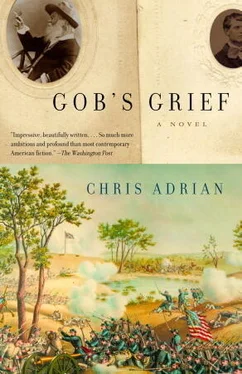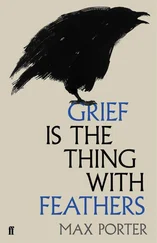* * *
Walt went back to New York in the second week of January of 1873 because he wanted to sleep without Gob and Hank pestering him all night long, and also because he thought that seeing Gob again would help rid him of the weighty feeling — the deep grief that he could feel in his belly, as if he’d eaten stones. This feeling was on him like the old feeling he’d had before he went down to Washington looking for his brother. Walt felt tired and hopeless, as if all his days had been lived for nothing, and all his work was nothing more than whispering into his own hands — no one had heard, and no one cared. On the train he slept a dreamless, squeezeless sleep, the first in months. When he woke he felt no less weary.
When Gob opened his door and found Walt standing there, he said, “You’re just in time.” Beyond the foyer, Walt could see that the house was transformed. Walls had been knocked down, ceilings removed through all five floors, so what was formerly many rooms on many floors was now a huge barnlike edifice spanned by immense arches like the ribs of some leviathan. Gob put on his coat and pushed Walt out the door. “We’d better hurry.”
“Where are we going?” Walt asked.
“To hear a speech,” Gob said. “Didn’t you get my letter? You were expressly invited, and now here you are.”
“I got it,” Walt said. “I’ve been dreaming….” He tried to tell Gob that he’d been haunted by him in dream after dream, but for the first time since he was an infant Walt found himself at a total loss for words.
“Ah,” said Gob. “We can talk later.” Dr. Fie was waiting in the stable with a carriage all ready. He tipped his hat to Walt. “Mr. Whitman,” he said. When Walt and Gob were settled in their seats, he took off, driving the horses like a fiend. “Will’s a brave driver,” Gob said. “He used to drive an ambulance. We’ll make it in time.”
“Is your mother speaking from jail?” Walt asked.
“Jail?” said Gob. “No, she’s escaped! She’s escaped to New Jersey.”
“My mama, too,” Walt said. Gob had his arm around him and was squeezing, but it was not oppressive, as in the dreams. Walt wanted more of it.
Federal marshals were guarding all the entrances to the Cooper Institute, waiting, Gob said, to snatch up his mama if she dared show her face. Walt asked if she would really come.
“Of course she will,” said Gob. Walt looked around the rooms for Mrs. Woodhull, but found Gob’s wife instead. She was standing amid the crowd, all by herself, looking very tired. She returned his stare for a few moments, then shifted her attention to the stage, where a lady had come forward and begun to talk.
“The enemies of free speech,” she said, “have ringed this place round with marshals and police. Though our friends are free from Ludlow Street Jail, the custodians of the law guard the doors of the institute, and neither Mrs. Woodhull nor Miss Claflin can, no matter how much they may desire it, appear upon this platform tonight.” This announcement was greeted with howls and hisses.
The lady was trying to shout over the noise of the crowd that she had been deputized to read the speech, and that she would do so if they would only quiet down. As she shouted, an old Quakeress, dressed in a long gray cloak, a coal-scuttle bonnet, and heavy veils, joined the lady on the stage. The old woman walked half bent over, and held her hands before her as if blind. People laughed at her, thinking she was just a confused old biddy who had somehow managed to wander up on the stage, until suddenly she pushed the cloak back so it fell off her shoulders, and tore off her bonnet and veils. Victoria Woodhull stood revealed before the audience.
“Well,” said Gob. “There she is.” Her hair was all in disarray and her dress rumpled, but she looked proud and mighty. Her commanding presence precipitated a hush over the whole hall. The lady who had begun the speech smiled exultantly and said, “Ladies and gentlemen, I give you Victoria C. Woodhull!”
Cheers and applause filled the hall, but Mrs. Woodhull held up her hands for silence and got it immediately. “My friends and fellow citizens!” she began. “I come into your presence from the American Bastille, to which I was consigned by the cowardly servility of the age. I am still held under heavy bonds to return to that cell, upon a scandalous charge trumped up by the ignorant or the corrupt officers of the law, conspiring with others to deprive me, under the falsest and shallowest pretenses, of my inherited privileges as an American citizen. In my person, the freedom of the press is assailed, and stricken down, and such has been the adverse concurrence of circumstances that the press itself has tacitly consented, almost with unanimity, to this sacrilegious invasion of one of the most sacred of civil rights!”
She detailed all the particulars of the conspiracy against her. She told how Anthony Comstock was Beecher’s tool, how his agents had ransacked the offices of the Weekly , how Mr. Comstock had sworn to destroy her utterly if he had to spend all the energies of his life upon the job. But she didn’t look as if anybody could destroy her, that night. She was vibrant and magnetic and fascinating — even the marshals stared at her in wonder, and listened raptly. They seemed to forget that they were obligated to arrest her. Walt forgot some of his sadness, watching her.
At last, Mrs. Woodhull made her concluding exclamation. “Sexual freedom, the last right to be claimed for man in the long struggle for universal emancipation, the least understood and the most feared of all the freedoms, but destined to be the most beneficial of any — will burst upon the world!” There were roars of approval. She tore the rose from her throat and hurled it like a bomb into the crowd, then ran off the stage and up the aisle, through the reaching arms of people who tried to touch her as she passed, all the way to the back door, where two marshals were standing. She stopped, crossed her hands at the wrists, and surrendered.
“That was that,” said Gob.
* * *
Walt and Gob went to Pfaff’s after the speech. Gob seemed uninterested in visiting his mother in jail. “She won’t be there for long,” he said confidently, “and I have a more pressing concern, tonight.”
“What’s that?” Walt asked.
“You, of course,” said Gob. “You’ve come back to me, just as I hoped you would and knew you would.” They sat together for a while in silence, Gob’s hand on Walt’s hand, not touching their beer. Every so often, Gob would reach out to lift Walt’s chin so he could look into his eyes. “Yes,” he’d say, with deep satisfaction. “Yes, there you are.”
They went for a walk, after Pfaff’s, a long walk arm in arm, through the late-night crowds on Broadway, up even into the park, where they sat by the lake, holding hands in the same place where Tennie had found Walt’s planted book years before. Ghostly-looking sheep were out on the meadow.
They still had not said very much to each other. Walt wanted to protest, to say it could not be as it was before, to say, “You are not he.” But it was easier not to speak, and Walt had a fear that if he made a noise, Gob would take his hand away from him and never give it back again.
“My work is done,” Gob said at last, after an hour of sitting. “It’s complete. It only lacks you, Walt.”
“Me,” Walt said softly. Gob did not take away his hand.
“Did you think I was lying when I said I needed you? When I begged you to help me win, did you think it was a jest? They want to come back. Can’t you hear them begging to come back?”
“Not anymore,” Walt said. Though he’d spoken to Gob of Hank, he’d never mentioned the boy’s posthumous chattiness.
Читать дальше












